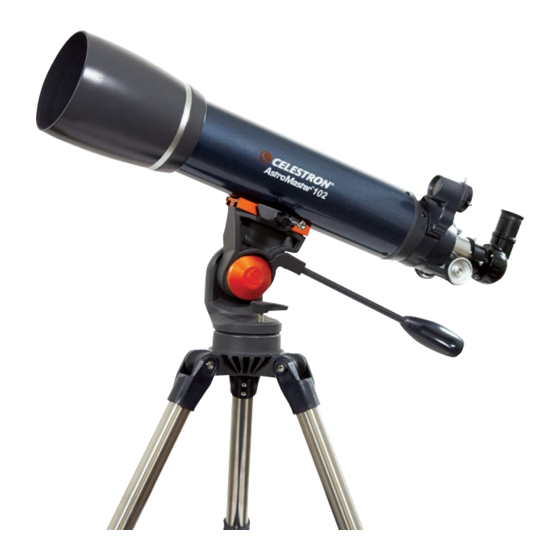Celestron AstroMaster 102AZ Manual de instrucciones - Página 9
Navegue en línea o descargue pdf Manual de instrucciones para Telescopio Celestron AstroMaster 102AZ. Celestron AstroMaster 102AZ 20 páginas. 102 mm refractor

TELESCOPE BASICS
A telescope is an instrument that collects and focuses light The nature of the optical design determines how the light is
focused Some telescopes, known as refractors, use lenses, other telescopes, known as reflectors (Newtonians), use
mirrors
Developed in the early 1600s, the refractor is the oldest telescope design It derives its name from the method it uses
to focus incoming light rays The refractor uses a lens to bend or refract incoming light rays, hence the name (see Figure
3-1) Early designs used single element lenses However, the single lens acts like a prism and breaks light down into
the colors of the rainbow, producing a phenomenon known as chromatic aberration To get around this problem, a
two-element lens, known as an achromat, was introduced Each element has a different index of refraction allowing two
different wavelengths of light to be focused at the same point Most two-element lenses, usually made of crown and flint
glasses, are corrected for red and green light Blue light may still be focused at a slightly different point
Fig. 3-1
A A
cutaway
view
of
the
light
path
of
the
cutaway
view
of
the
light
path
of
the
Refractor
IMAGE ORIENTATION
The image orientation changes depending on how the eyepiece is inserted into the telescope When using a star diagonal
with refractors, the image is right-side-up, but reversed from left-to-right (i e , mirror image) If inserting the eyepiece
directly into the focuser of a refractor (i e , without the diagonal), the image is upside-down and reversed from left-to-right
(i e , inverted) However, when using the AstroMaster refractor and the standard erect image diagonal, the images is
correctly oriented in every aspect
Image orientation as seen with the unaided
eye and using erecting devices on refractors
and Newtonians
Figure
3 -‐1
A cutaway view of the light path of the Refractor optical
design
design
Reversed from left to right, as viewed using
a Star Diagonal on a refractor
Fig. 3-2
Refractor
optical
optical
Inverted image, normal with Newtonians and
as viewed with eyepiece directly in a refractor
ENGLISH |
9
